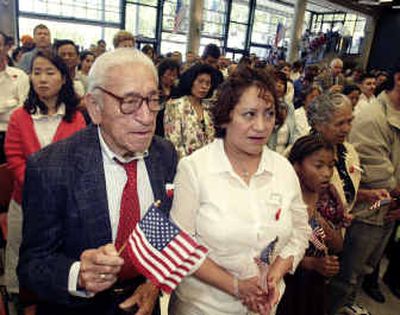Class-action immigration case certified

SEATTLE – As many as 1,000 people wrongly denied citizenship in Seattle could eventually be given the oath, thanks to a lawsuit brought by a Korean man who failed a citizenship test because he once gathered too many oysters along a Washington state beach.
From 1998 to 2004, the Seattle office of U.S. Citizenship and Immigration Services misapplied the “good moral character” standard for naturalization. Officials concede they routinely denied citizenship if people had minor infractions on their record, such as in the case of Kichul Lee, who in 1999 was fined $152 for collecting 51 oysters, almost three dozen more than the state’s limit.
At the time, Lee didn’t know there was a limit. He paid the fine but was denied citizenship because of it in 2003, despite meeting every other requirement. A judge last month certified his lawsuit against the immigration office as a class action – meaning that anyone denied because of traffic infractions or arrests that didn’t result in charges, for example, could join it.
“We’re looking for them to follow the proper standard in deciding whether someone has good moral character,” said Lee’s attorney, Robert Gibbs. “Taking too many oysters off the beach doesn’t show you lack good moral character.”
Immigration officials in Seattle agree, and since the lawsuit was filed, they have reversed their rulings against Lee and some of the other named plaintiffs. They have also reassigned a supervisor who oversaw the decisions, retrained workers to teach them that minor violations don’t warrant a rejection of citizenship, and promised that by this month they’ll start informing people denied citizenship of their right to appeal in federal court – something they were supposed to be doing all along.
But those steps were not enough to satisfy U.S. District Judge Robert Lasnik.
“The court does not have before it sufficient information to determine what problems existed before defendants initiated their retraining program, whether the newly implemented procedures resolve plaintiffs’ complaints, or whether there is a possibility the challenged conduct will recur,” Lasnik wrote.
Kristin Johnson, an assistant U.S. attorney representing the Seattle immigration office, said she believed Lasnik’s ruling was fair and that establishing a class would be a good way to determine how extensive the good moral character denials were. The office is determined to correct them and make sure they don’t happen again, she said.
“We’re more than willing to explore it with the court to see if what we’ve done was sufficient, and if not, to see what more can be done to make sure it is sufficient,” Johnson said.